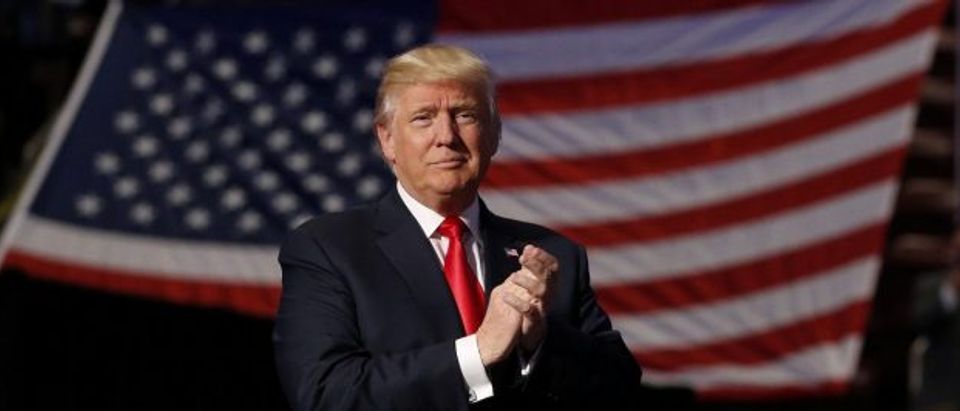Even today, as the Electoral College votes, Democrats continue to whine that Russia “hacked the election.” Ignore them. The stolen emails about Hillary Clinton contained no bombshells or smoking guns, and would have been a non-story without publicity by Wikileaks and American news media. And the revelations did nothing more than substantiate what Bernie Sanders and Donald Trump had been saying for months – that Clinton is a phony.
Few Americans can describe the specific leaks that hurt Clinton, and media reports of “Russian interference” rarely give examples of damaging disclosures. Why? Because the details actually don’t matter; the affair hurt Clinton’s candidacy simply by authenticating her inauthenticity:
- Clinton’s official and private stances diverged. The leaked emails undermined Clinton’s posture as an opponent of single-payer health care and a cautious reformer on immigration by publicizing private speeches to the contrary. Her denials she was Wall Street’s candidate rang hollow in light of her comments to a Goldman Sachs symposium that she “represented all of you” and had “a lot of respect for the work you do.” And the two faces of Clinton seemed deliberate, since she said that on important issues, politicians “need both a public and a private position.”
- Clinton’s team cheated for political advantage. The Clinton campaign received advance notice from the Justice Department of not-yet-public developments in the investigation into her improper use of email, and from a CNN contributor about upcoming debate questions. Clinton also received behind-the-scenes assistance from the supposedly neutral Democratic National Committee, including a top party official who suggested the party solidify Clinton’s Southern Baptist support by having someone ask the Jewish Sanders if he believes in God.
- Clinton was for sale. According to The New York Times, hacked Democratic National Committee emails showed “elaborate, ingratiating and often bluntly transactional exchanges” with top donors to provide plum posts and even physical proximity to President Obama based on the extent of their financial support. As many suspected, the Clinton Foundation also sold donors special access to the candidate and her husband, and even led foreign nations to expect State Department favors in consideration for their generosity.
None of the revelations were truly scandalous, though, or Republicans would have demanded hearings, investigations, and criminal charges. Rather, the hacked emails simply filled out the inchoate impression that candidate Clinton was packaged and carefully marketed – in sharp relief to her more candid primary and general-election opponents. Perhaps that’s why Russia has never shared the content of Republican emails it also hacked. Russian spies would be hard-pressed to paint Trump as phony, since his shortcomings are so forthright.
True foreign interference would involve much worse meddling than confirmation Clinton is a poseur. An election outcome altered through actual cheating would indeed undermine its legitimacy; examples include someone manipulating voting machines, bribing and blackmailing members of the Electoral College, or planting and disseminating false information about a candidate.
There is no evidence Russia did anything like that. And the accurate but unflattering revelations about Clinton would be confined to fringe Web sites had they not been promoted by Wikileaks and a complicit news establishment. If judges exclude illegally obtained evidence and scientists spurn Nazi research, why isn’t The New York Times “interfering with elections” when it publishes factual but stolen data?
Well, that’s what newspapers do, thank God. Remember the Pentagon Papers? Several months before President Richard Nixon’s re-election campaign, The Times published excerpts from an explosive Defense Department account of the Vietnam War smuggled from work by military analyst Daniel Ellsberg. Had their disclosure come from the USSR instead, would that have constituted foreign interference in an election? The information was true. Would more ignorance about Vietnam really have served American voters selecting a president in 1972?
Computer hacking and Russian malice are certainly dangers to the nation. But so is politically generated doubt in fairly conducted American elections.
Democrats oh-so-piously denounced Trump in the closing days of the election for refusing to pre-accept the legitimacy of its results. Trump has not stopped expressing unfounded doubts about the fairness of the 2016 vote. Democrats mustn’t join him, lest Americans stop believing their votes matter. That would surely gratify the only American president in history to have suggested the nation should “just cancel the election” and declare him the winner (“What are we even having it for?”).
I don’t like the result of the 2016 election. But it wasn’t hacked, it wasn’t illegitimate, and Russia’s only “influence” involved fraudulently obtaining true information soon repeated by Wikileaks, major American media, and millions of Facebook and Twitter users. Hacking, like all stealing, is wrong. But the only reason to oppose a more informed electorate would be to prop up your own candidate’s bogus persona. Voters deserve to hear all relevant, accurate information regardless of its provenance.
Choosing a president is too important.
David Benkof is a columnist for the Daily Caller. Follow him on Twitter (@DavidBenkof) or email him at DavidBenkof@gmail.com.


